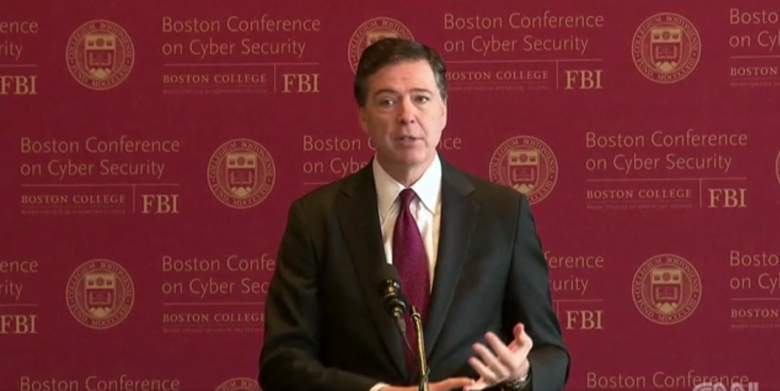 2395
2395
 2017-03-10
2017-03-10

FBI director James Comey has warned that we should not expect “absolute privacy” in America. His comments come just days after a WikiLeaks dump revealed the CIA’s incredible arsenal of malware and viruses used to spy on iPhones and other smart devices.
Speaking at a Boston College conference on cybersecurity this week, Comey said that while the government cannot invade our privacy without good reason, “there is no place outside of judicial reach.”
Comey didn’t comment on this week’s WikiLeaks dump, but his comments come at a time when America is questioning how the CIA has been allowed to develop a catalog of “weaponized” software that turns our smartphones, tablets, and even TVs into covert spying tools.
It is your right to privacy as an American citizen, and Comey acknowledged that during his talk. But he warned that with good reason, the U.S. government can invade every aspect of your personal life for the safety and security of others.
“Even our memories are not absolutely private anymore,” he said in a video obtained by CNN.
“Any of us can be compelled, in appropriate circumstances, to say what we remember, what we saw. Even our communications with our spouses, with our clergy members, with our attorneys are not absolutely private in America.”
“In appropriate circumstances, a judge can compel any one of us to testify in court about those very private communications,” Comey continued. “There is no such thing as absolute privacy in America. There is no place outside of judicial reach.”
Comey did insist, however, that there are “really, really important constraints on law enforcement — as there should.” He also said that every American should have “a reasonable expectation of privacy in our home, in our cars, in our devices.”
But it’s interesting that he made no mention of the WikiLeaks revelation. Testifying in court, and being aware of the information you give up, is totally different to having the CIA install malware on your phone and TV to record every conversation you have.
Of course, Comey was the one calling for Apple to weaken the security of iOS so that the government could break into iPhones if they needed to when the FBI was trying to gain access to an iPhone 5c used by a San Bernadino shooter.
Nevertheless, Comey concluded his speech by saying, “We all value privacy. We all value security. We should never have to sacrifice one for the other. Our founders struck a bargain that is at the center of this amazing country of ours and has been for over two centuries.”
Source: cult of mac